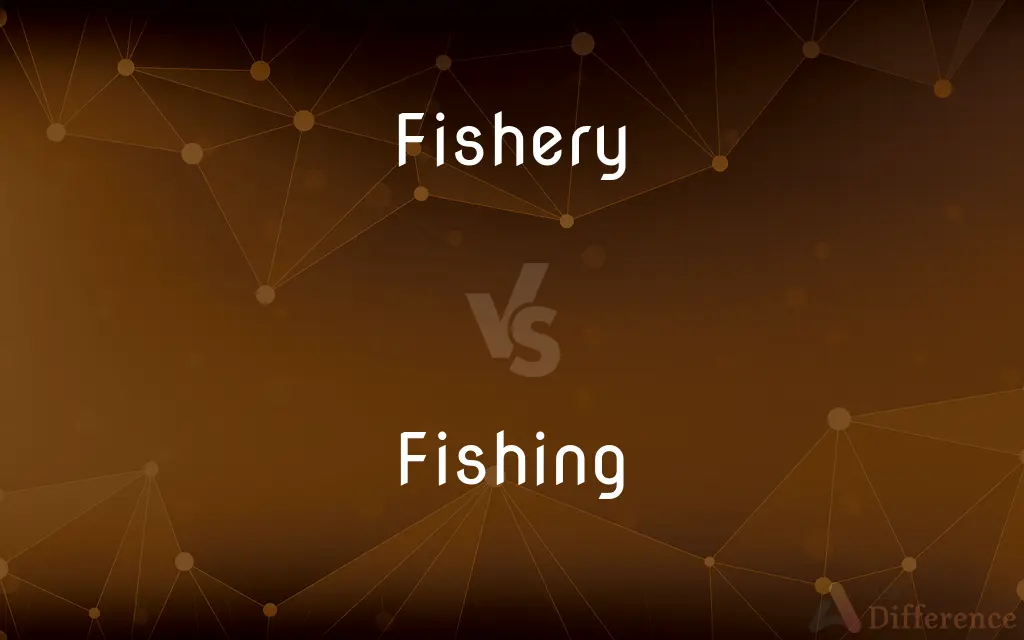Fishery vs. Fishing — What's the Difference?
Edited by Tayyaba Rehman — By Fiza Rafique — Updated on April 4, 2024
Fishery involves the harvesting of fish and aquatic resources from specific areas, focusing on management and conservation, while fishing refers to the act of catching fish, either as a hobby or for commercial purposes.

Difference Between Fishery and Fishing
Table of Contents
ADVERTISEMENT
Key Differences
Fishery is a term that encompasses not just the activity of fishing, but also the management and conservation of aquatic resources. It involves the controlled harvesting of fish and other aquatic organisms from freshwater or marine environments. Fisheries can be wild, where fish are caught in their natural habitats, or farmed, in aquaculture operations. On the other hand, fishing is the act of catching fish, which can be done for leisure (recreational fishing) or as part of the commercial fishing industry, where the catch is sold for consumption or use in various products.
While fisheries are concerned with sustainable practices, regulations, and the economic aspects of aquatic resource extraction, fishing as an activity focuses more on the techniques and tools used to catch fish. This can include a wide range of methods, from simple rod-and-reel fishing to complex commercial operations involving large ships and sophisticated equipment.
The concept of a fishery includes not only the fish stock but also the fishermen, the vessels, and the ecological and economic systems in which they operate. It aims at maintaining fish populations at sustainable levels to prevent overfishing and ensure the long-term viability of the fishery. Fishing, however, is primarily concerned with the immediate act of catching fish, without necessarily considering the broader implications on fish populations or ecosystems.
Fisheries management is a critical aspect of the fishery sector, focusing on setting quotas, regulating fishing seasons, and implementing other measures to manage fish stocks effectively. This contrasts with fishing, where the emphasis is on the skill, experience, and sometimes the luck of the individual or team in catching fish.
Sustainability is a key difference between the two concepts. Fishery management involves strategies to ensure that fishing practices do not deplete fish populations or harm their habitats, ensuring that aquatic resources remain available for future generations. Fishing, especially when done recreationally, may not always involve this level of concern for sustainability or resource management, although responsible fishermen do follow regulations and best practices to minimize their environmental impact.
ADVERTISEMENT
Comparison Chart
Definition
The management and conservation of fish and aquatic resources.
The act of catching fish.
Focus
Sustainability, regulation, economic aspects.
Techniques, tools, recreational or commercial activity.
Types
Wild (natural habitats) and farmed (aquaculture).
Recreational, commercial.
Key Concerns
Sustainable practices, fish populations, ecosystem health.
Catching fish, enjoyment, profit.
Management
Quotas, fishing seasons, conservation measures.
Individual skill, experience, adherence to regulations.
Compare with Definitions
Fishery
Resource Management.
Fisheries management includes habitat protection to ensure fish populations thrive.
Fishing
Recreational Activity.
He enjoys fishing on weekends as a way to relax and connect with nature.
Fishery
Aquaculture.
The salmon fishery relies on both wild catches and aquaculture to meet demand.
Fishing
Economic and Cultural Significance.
Fishing festivals celebrate the cultural importance of fishing in coastal communities.
Fishery
Sustainable Harvesting.
The local fishery implements quotas to prevent overfishing.
Fishing
Commercial Industry.
Commercial fishing provides seafood to markets worldwide.
Fishery
Economic Impact.
The fishery sector significantly contributes to the local economy through employment.
Fishing
Techniques and Tools.
Fly fishing requires specific techniques and equipment compared to deep-sea fishing.
Fishery
Regulation and Conservation.
New regulations in the fishery aim to protect endangered species.
Fishing
Sustainability Practices.
Catch and release is a fishing practice that promotes conservation.
Fishery
A place where fish or other aquatic animals are caught.
Fishing
Fishing is the activity of trying to catch fish. Fish are often caught in the wild but may also be caught from stocked bodies of water.
Fishery
Fishery is the enterprise of raising or harvesting fish and other aquatic life. Commercial fisheries include wild fisheries and fish farms, both in fresh water (about 10% of all catch) and the oceans (about 90%).
Fishing
The act, occupation, or sport of catching fish.
Fishery
The industry or occupation devoted to the catching, processing, or selling of fish, shellfish, or other aquatic animals.
Fishing
A place for catching fish.
Fishery
A fishing business.
Fishing
(uncountable) The act of catching fish.
We had a good day's fishing at the weekend.
Fishery
A hatchery for fish.
Fishing
The act of catching other forms of seafood, separately or together with fish.
Fishery
The legal right to fish in specified waters or areas.
Fishing
(uncountable) Commercial fishing: the business or industry of catching fish and other seafood for sale.
This is good news for the fishing industry.
Fishery
(uncountable) Fishing: the catching, processing and marketing of fish or other seafood.
Fishing
(countable) A fishery, a place for catching fish.
Fishery
(countable) A place related to fishing, particularly:
Fishing
Present participle of fish
Fishery
A place where fish or other seafood are caught: a fishing ground.
Fishing
The act, practice, or art of one who fishes.
Fishery
A place where fish or other seafood are raised: a fish farm.
Fishing
A fishery.
Fishery
A place where fish or other seafood are processed: a seafood factory.
Fishing
Pertaining to fishing; used in fishery; engaged in fishing; as, fishing boat; fishing tackle; fishing village.
Fishery
(countable) A right to fish in a particular location; Territorial fishing waters.
Fishing
The act of someone who fishes as a diversion
Fishery
(countable) A fishing company.
Fishing
The occupation of catching fish for a living
Fishery
The business or practice of catching fish; fishing.
Fishery
A place for catching fish.
Fishery
The right to take fish at a certain place, or in particular waters.
Fishery
A workplace where fish are caught and processed and sold
Common Curiosities
Can fishing be part of a fishery?
Yes, fishing is a component of fisheries, as it's the activity through which fish are caught, either for commercial purposes or recreation.
How does recreational fishing impact fisheries?
Recreational fishing can impact fisheries by contributing to fish population declines if not managed with conservation measures like catch limits and seasons.
What role do regulations play in fisheries and fishing?
Regulations ensure sustainable fishing practices, prevent overfishing, and protect endangered species, crucial for the health of aquatic ecosystems and the long-term viability of fishing activities.
What sustainability practices are common in fisheries?
Common practices include setting quotas, seasonal restrictions, gear restrictions, and creating marine protected areas.
What is the primary difference between fishery and fishing?
The primary difference lies in scope: fishery includes the management and conservation of aquatic resources, while fishing refers to the act of catching fish.
Why is fishery management important?
Fishery management is crucial for maintaining sustainable fish populations, protecting ecosystems, and ensuring the economic viability of fishing communities.
Can individuals contribute to fishery conservation while fishing?
Yes, by adhering to regulations, practicing catch and release, and using sustainable fishing gear, individuals can contribute to conservation.
How do aquaculture fisheries differ from wild fisheries?
Aquaculture fisheries involve breeding and raising fish in controlled environments, while wild fisheries rely on catching fish in their natural habitats.
How does commercial fishing affect fish populations?
Without proper management, commercial fishing can lead to overfishing, reducing fish populations below sustainable levels and disrupting ecosystems.
How are fishery resources monitored?
Monitoring involves scientific assessments of fish populations, catch data analysis, and surveillance of fishing activities.
What challenges do fisheries face?
Challenges include overfishing, illegal fishing, habitat destruction, climate change, and pollution.
What is the cultural importance of fishing?
Fishing is integral to the cultural heritage of many coastal communities, with traditions and festivals celebrating the relationship between people and the sea.
What is the economic significance of fisheries?
Fisheries provide employment, support coastal economies, and are a primary source of seafood for global markets.
How do climate change and environmental factors affect fisheries?
Climate change can alter ocean temperatures and currents, affecting fish distributions, breeding patterns, and ecosystem health, posing challenges to fisheries management.
How does technology aid in fishery management?
Technology aids through satellite monitoring, electronic reporting systems, and advancements in aquaculture practices.
Share Your Discovery

Previous Comparison
Arbor vs. Mandrel
Next Comparison
Awesome vs. WickedAuthor Spotlight
Written by
Fiza RafiqueFiza Rafique is a skilled content writer at AskDifference.com, where she meticulously refines and enhances written pieces. Drawing from her vast editorial expertise, Fiza ensures clarity, accuracy, and precision in every article. Passionate about language, she continually seeks to elevate the quality of content for readers worldwide.
Edited by
Tayyaba RehmanTayyaba Rehman is a distinguished writer, currently serving as a primary contributor to askdifference.com. As a researcher in semantics and etymology, Tayyaba's passion for the complexity of languages and their distinctions has found a perfect home on the platform. Tayyaba delves into the intricacies of language, distinguishing between commonly confused words and phrases, thereby providing clarity for readers worldwide.














































